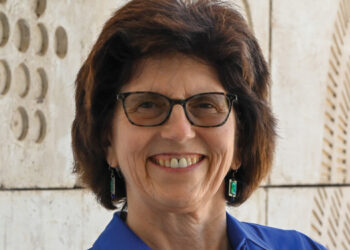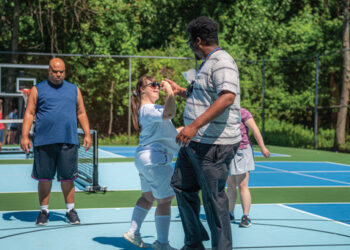Children of all ages come into your facility each day, whether it be for child-care services, swim lessons or sports. But how can you ensure you are doing your part to instill long-lasting, healthy values in them before they leave?
Aquatics
Your aquatics department is a perfect place to start, as many youth in your community are enrolled in swim lessons or competitive swim leagues. Aquatics programs are also where many kids first learn about water safety. “Water safety for all helps save lives,” said Lori Kleist, the aquatic director at the Eau Claire YMCA (ECY), a branch of the YMCA of the Chippewa Valley association in Eau Claire, Wisconsin. “Introducing swimming skills at a young age gives individuals a lifelong skill they can use for enjoyment and exercise.”
At her Y, Kleist offers parent and child swim lessons, and preschool, youth and private swim lessons, as well as safety courses and various water exercise classes.
Paula Caucutt, the ECY director of competitive aquatics, also uses swimming to incorporate healthy values for members of the ECY Marlins Swim Team.
“The ECY Marlins Swim Team has occasional story times when we read and discuss different aspects of healthy living, including nutrition, setting goals, appropriate practice guidelines and rules,” said Caucutt. “We bring in articles found on the internet that include other people’s experiences and struggles with real-life issues — usually swimmers who have swum in the Olympics, as the swimmers can relate best to that.”
Caucutt finds the atmosphere of story time creates common goals and respect toward others within her team. “I think teaching values at a young age is very important to their development as responsible and kind members of any group or organization,” she elaborated. “If we can reinforce what the children are learning in school and with other organizations, then the impact is greater.”
Healthy Eating
Most often in community rec centers, you think of physical activity and programs to keep kids engaged. But at the ECY, childcare is a special offering, and is part of the Department of Instruction Food Program. “This program offers financial grants to programs that follow the specific food patterns required,” explained Nicholas Salimes, the ECY childcare director. “These meal patterns include making sure each student is offered a variety of healthy foods while in our care.”
What about when these children leave your facility? It’s important to not only instill these values in youth, but also educate parents so they can continue their learning at home.
“Letting parents know we are part of this program, and introducing healthy eating within our center, could have an effect on what they choose to serve at home,” said Salimes. “We are also introducing children to fresh foods they may not get an opportunity to try at home. If we can have a child start liking certain foods in our care, perhaps they would start requesting these different healthy options at home.”
Salimes encouraged teaching these habits earlier, and emphasizes exposure as a key to ensuring these values stick. “Expose children to healthy habits as early as possible,” he said. “Expose children to a large variety of healthy foods and let them decide what they may like or dislike — expose children to where healthy food comes from and how to prepare it.”
Summer Camps
Summer camps are plentiful in community rec centers, and many youth and parents rely on them for a number of reasons, whether it’s childcare services, physical exertion, socialization, or to learn and practice skills. This is why the healthy living department at the YMCA of the Chippewa Valley has summer programs specifically highlighting youth at their branches.
“We have our Athletic Enhancement Camp, which is for young athletes, ages 12 to 18,” said Jamie Hoover, the association director of healthy living. “Our niche tends to be 12 to 16 years old, as they are not in varsity sports yet, so they have some freedom to choose what their summer offseason programming consists of.”
In this camp, athletes from beginner through advanced learn to develop a healthy foundation and proper mechanics for weight training, speed and agility drills. “The camp programming is written and staffed by certified personal trainers to ensure the highest measures and values possible,” explained Hoover. “We spend time discussing the importance of a healthy lifestyle and how it impacts their performance in their respective sports.”
Also offered is the Introduction to Athletic Enhancement program for ages 10 to 12 years old, which focuses on active play and utilizing foundational skills that will be needed as young athletes age. “A lot of the games or drills pay close attention to developing or enhancing proprioceptive awareness and efficiency,” elaborated Hoover.
Again, with all the information youth can retain while in your facility or during camps, it’s vital to provide something a little extra for practicing continued values at home. This is why, at the end of each camp, packets of information are sent home with kids, focusing on what was learned.
“We also give them any notes we may have taken during the camp,” explained Hoover. “A great example would be if a young athlete has trouble with squat mechanics because of an imbalance or a tight muscle, we might recommend corrective exercises or stretches.”
Overall, the easiest and most effective way to instill healthy values is to represent your organization’s core values. “In every program, lesson and activity, we are teaching and modeling these values and asking, ‘Are we being honest, are we being caring, are we being respectful and are we being responsible to others, and to our own minds, bodies and spirits?’” shared Caroline Wee, the association childcare services director. “Everything we do comes back to these values and it is imperative we begin to teach them as soon as possible.”










